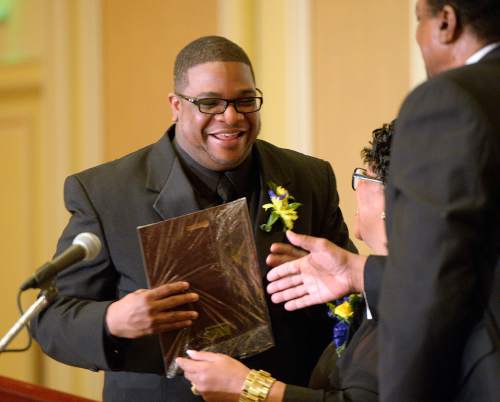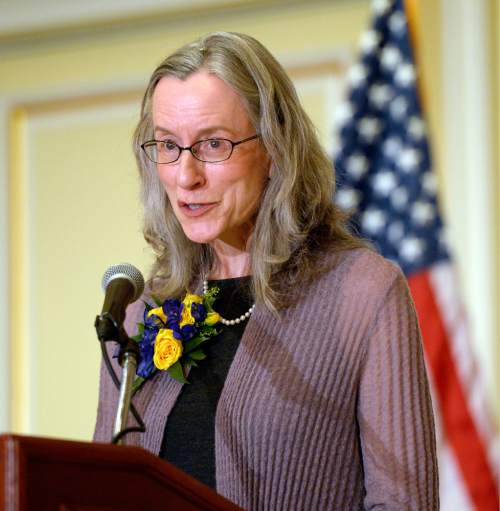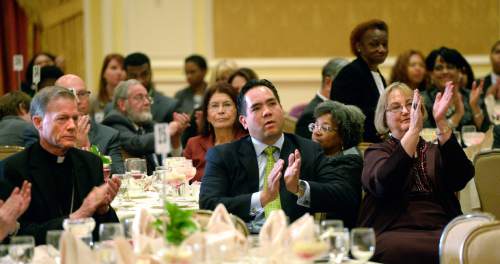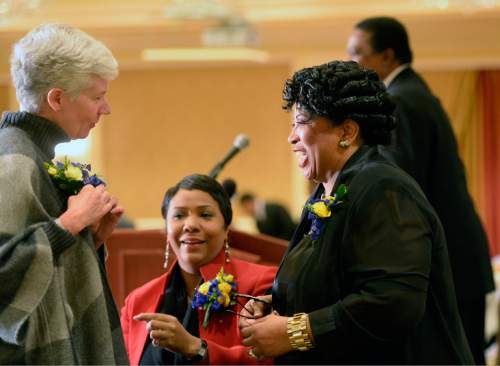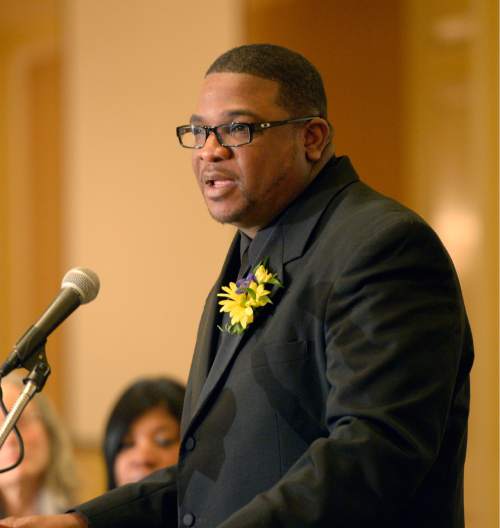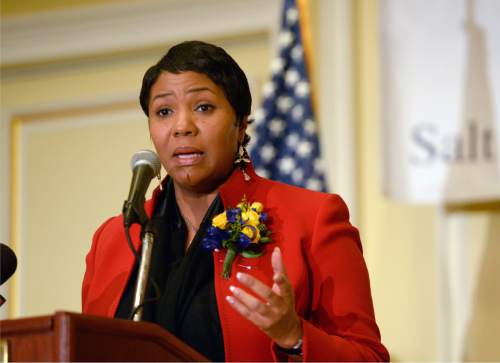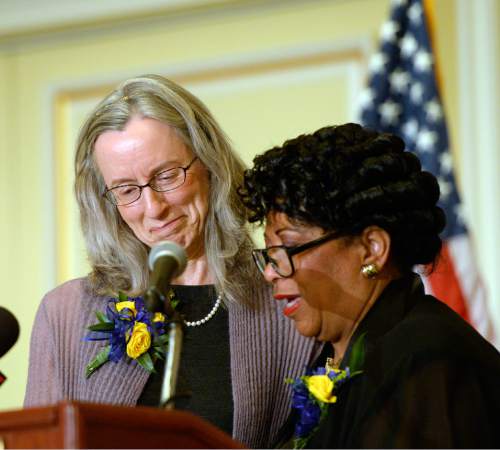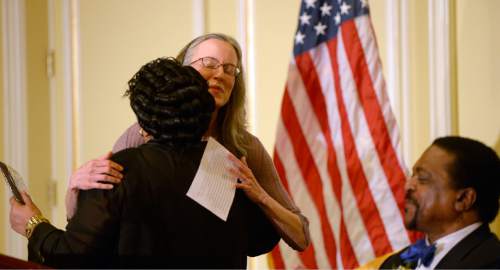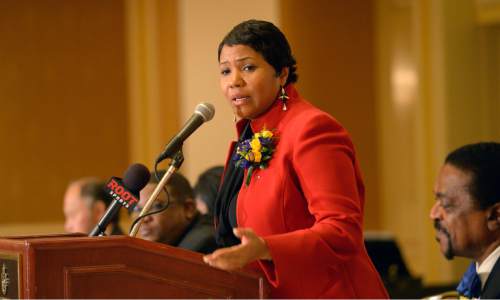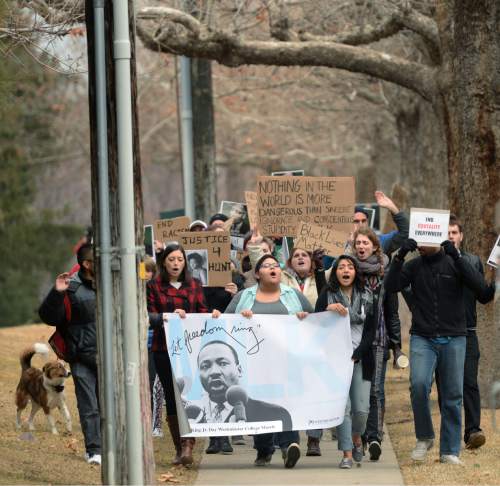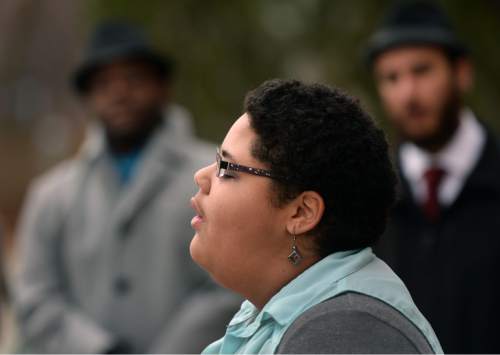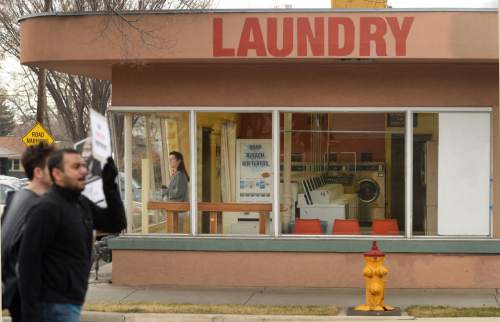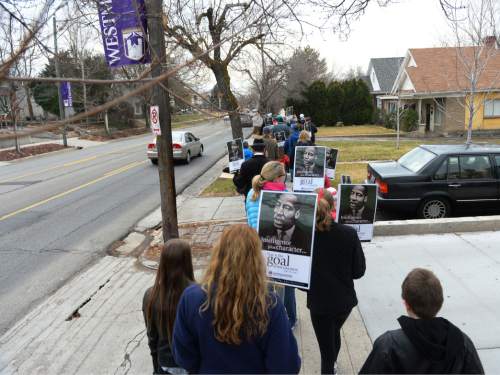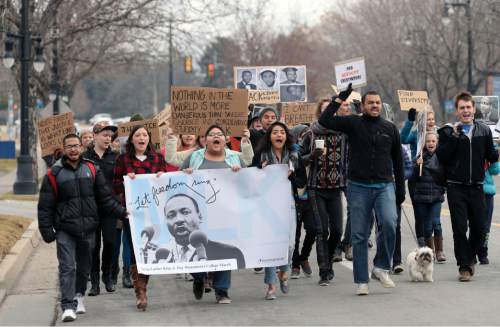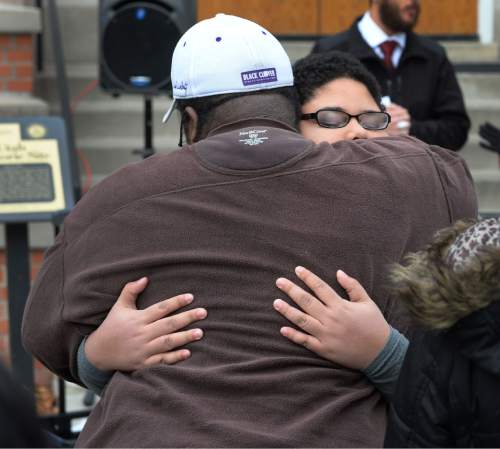This is an archived article that was published on sltrib.com in 2015, and information in the article may be outdated. It is provided only for personal research purposes and may not be reprinted.
Ferguson and Selma.
The protests in cities nationwide following the 2014 police shooting of an unarmed black man in Missouri and the civil rights marches of 50 years ago that led to the Voting Rights Act.
Utahns who attended a Martin Luther King Jr. Day event Monday said the connection between these events is obvious and unmistakable.
"If feel this is another part of the movement," said Tanesha Tyler, a black student at Westminster College, who joined more than 50 others who marched to honor King and protest what they see as police brutality that all too often targets African Americans. "If I say the pledge that says 'for liberty and justice for all,' I want that to be true anywhere in the world."
These marchers were diverse in race, age and ability and they loudly chanted "black lives matter" and "hands up, don't shoot" as they marched through a few blocks of Sugar House, surrounding the campus of this private college.
Among them was Gary Marquardt, an associate professor of history. His wife and his two adopted boys, 10 and 5, are black.
"Our family is a result of Dr. King's work," said Marquardt, who is white. He has brought his boys to the annual march for a few years now and, while they consider it "humdrum," he hopes they one day see the connection between these actions and those of King 50 years ago that led to advances in legal equality for black Americans.
"This way, at least they get a taste of it," he said, and a sense that the fight hasn't ended. He said it's an "organic connection" to use a day to honor King to also protest events such as the shooting in Ferguson. In that case, a grand jury declined to charge the police officer and there remains a dispute over whether that officer needed to use deadly force. Ferguson has become a rallying cry for people who believe the police do not treat black men the same as others in our society.
Tamara Stevenson, an assistant professor of communication at Westminster, listed the black men in her life — her father, her brothers and uncles, cousins and friends.
"I wonder if law enforcement will protect them or hunt them," she told the crowd. "If it happens to one of us, it happens to all of us."
Organizers needed a permit to march and a police escort. One of those officers said it was unfortunate that these Utahns were tying a remembrance of Dr. King to a protest of police actions, before saying he did not want to be interviewed or identified.
Salt Lake City Police Chief Chris Burbank was among 10 law enforcement officers who attended the NAACP Salt Lake Branch's 31st annual Martin Luther King memorial luncheon. He noted that he is a member of the civil rights organization. He said protesters shouldn't lump all police into one group.
"The reason we don't have the problems you see in other parts of the country is by building relationships just like this," Burbank said.
Provo Police Chief John King has been an NAACP member for 10 years. He said everyone should follow King's example and treat people as individuals, though he said the dialogue started by the Ferguson protests is healthy.
"I think it is appropriate to have a national dialogue," he said. "If we are talking, things are going to get better."
That's a view shared by Jeanetta Williams, president of the NAACP's Salt Lake Branch. She made a special effort to invite law enforcement officials to the luncheon, which drew a crowd of about 400. And she noted their attendance in her remarks, thanking them for meeting with the NAACP in September to discuss the use of body cameras by police officers. Many of Utah's law enforcement agencies have ramped up their use of such cameras.
Williams said their use will help the community know what really happens when citizens have an altercation with the police and they should help the police see if officers are responding to training.
The NAACP isn't going to be as aggressive as the protesters.
"We are not going to go out and outright criticize the police. We want a working relationship. We want the ability to sit down and talk," Williams said. "Not every police officer is a bad police officer, and not every one is a good one either."
Not everyone at Monday's march was tied to Westminster College. Braden Facemeyer, a 21-year-old white student at Utah Valley University, drove to Salt Lake City from his home in Lindon to participate. He said he's an admirer of King's and he hopes that as people push for change, they keep his example in mind.
"I think Dr. King had a lot of really good principles," Facemeyer said. "He stood for non-violence and encouraged everyone to be a good person."
Protesters have kept King in mind, said Pratik Raghu, a senior at Westminster, who held a sign that read "We're standing our ground." He pointed at the march and referenced other actions, such as die ins, where protesters lay on the ground and refuse to move, as ideas that harken back to the Civil Rights era, which he noted has been memorialized in a movie this year. "Selma" focuses on the marches in Alabama that preceded the Voting Rights Act and the effectiveness of non-violent resistance.
He said that movie and King's actions show a path forward to the protesters of today, who should "echo King's message of peace, love and unity."
NAACP award winners
At Monday's MLK luncheon, the NAACP Salt Lake Branch honored two Utahns for the work in promoting civil rights.
Pastor Corey J. Hodges of the New Pilgrim Baptist Church received the Dr. Martin Luther King Jr. Award. He became the Utah-based church's pastor in 1998 and has been an active contributor to the community, serving on boards and organizations involving foster care, economic development and government ethics.
Anne Burkholder, the CEO of the YWCA Utah, received the Rosa Parks Award. Burkholder has highlighted disparities between the earnings, education and health of Utah's men and women, and has championed an effort to get more women to run for elected office.


